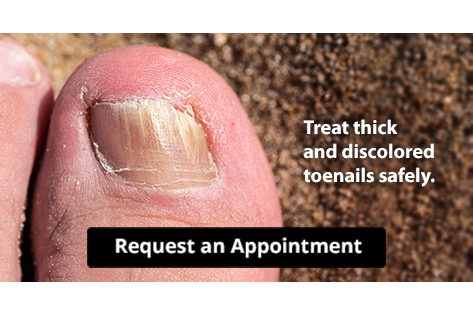Items filtered by date: August 2025
Reasons for a Broken Pinky Toe
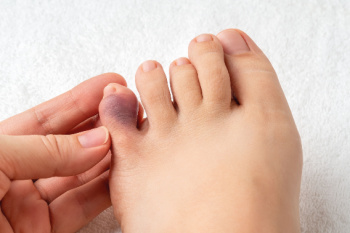
A broken pinky toe is a fracture of the smallest toe, often caused by stubbing it against furniture, dropping a heavy object, or sports injuries. Symptoms can include sharp pain, swelling, bruising, and difficulty walking or wearing shoes. Even though the pinky toe is small, a fracture can affect balance and gait, leading to additional foot strain. A podiatrist can confirm the diagnosis with an examination and imaging, provide proper immobilization, recommend supportive footwear, and guide recovery to prevent complications. They may also address any misalignment to ensure proper healing. If you have broken your pinky toe, it is suggested that you promptly consult a podiatrist who can accurately diagnose and treat this type of toe fracture.
A broken toe can be very painful and lead to complications if not properly fixed. If you have any concerns about your feet, contact Amy DeGirolamo, DPM from Florida Foot and Ankle Associates. Our practitioner will treat your foot and ankle needs.
What to Know About a Broken Toe
Although most people try to avoid foot trauma such as banging, stubbing, or dropping heavy objects on their feet, the unfortunate fact is that it is a common occurrence. Given the fact that toes are positioned in front of the feet, they typically sustain the brunt of such trauma. When trauma occurs to a toe, the result can be a painful break (fracture).
Symptoms of a Broken Toe
- Throbbing pain
- Swelling
- Bruising on the skin and toenail
- The inability to move the toe
- Toe appears crooked or disfigured
- Tingling or numbness in the toe
Generally, it is best to stay off of the injured toe with the affected foot elevated.
Severe toe fractures may be treated with a splint, cast, and in some cases, minor surgery. Due to its position and the pressure it endures with daily activity, future complications can occur if the big toe is not properly treated.
If you have any questions, please feel free to contact our office located in Miami,FL . We offer the newest diagnostic and treatment technologies for all your foot care needs.
How Podiatrists Help Heal Foot Wounds
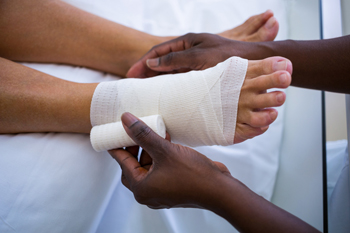
Podiatrists play a vital role in managing wounds on the feet and lower legs, which people with diabetes, poor circulation, or nerve damage are especially prone to. Foot wounds can heal slowly due to reduced blood flow and constant pressure from walking, increasing the risk of infection. A podiatrist begins with a detailed evaluation to identify the cause and severity of the wound. Treatment may involve removing damaged tissue, applying specialized dressings, and using offloading devices to reduce pressure on the affected area. They also monitor healing progress and work closely with other healthcare providers, when needed. Prompt, expert care from a podiatrist can prevent complications, including severe infection or limb loss. If you have a slow-healing or infected wound on your foot, it is suggested that you see a podiatrist promptly for professional assessment and effective care.
Wound care is an important part in dealing with diabetes. If you have diabetes and a foot wound or would like more information about wound care for diabetics, consult with Amy DeGirolamo, DPM from Florida Foot and Ankle Associates. Our practitioner will assess your condition and provide you with quality foot and ankle treatment.
What Is Wound Care?
Wound care is the practice of taking proper care of a wound. This can range from the smallest to the largest of wounds. While everyone can benefit from proper wound care, it is much more important for diabetics. Diabetics often suffer from poor blood circulation which causes wounds to heal much slower than they would in a non-diabetic.
What Is the Importance of Wound Care?
While it may not seem apparent with small ulcers on the foot, for diabetics, any size ulcer can become infected. Diabetics often also suffer from neuropathy, or nerve loss. This means they might not even feel when they have an ulcer on their foot. If the wound becomes severely infected, amputation may be necessary. Therefore, it is of the upmost importance to properly care for any and all foot wounds.
How to Care for Wounds
The best way to care for foot wounds is to prevent them. For diabetics, this means daily inspections of the feet for any signs of abnormalities or ulcers. It is also recommended to see a podiatrist several times a year for a foot inspection. If you do have an ulcer, run the wound under water to clear dirt from the wound; then apply antibiotic ointment to the wound and cover with a bandage. Bandages should be changed daily and keeping pressure off the wound is smart. It is advised to see a podiatrist, who can keep an eye on it.
If you have any questions please contact our office located in Miami,FL . We offer the newest diagnostic and treatment technologies for all your foot and ankle needs.
Stop Your Toenail Fungus
Toenail Fungus and a Podiatrist’s Role
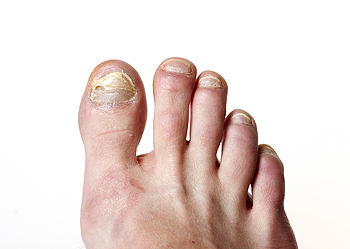
Toenail fungus, also known as onychomycosis, is an infection that affects the nail bed and causes the nail to become thickened, discolored, brittle, and sometimes painful. It develops when fungi enter the nail through small cracks or separations, often thriving in warm and moist environments like shoes and public locker rooms. Common causes include prolonged exposure to damp conditions, poor foot hygiene, and a weakened immune system. A podiatrist can diagnose the infection, provide treatments such as topical or oral medications, perform nail debridement, and offer preventive care to stop the recurrence of toenail fungus. If you have symptoms of toenail fungus, it is suggested that you schedule an appointment with a podiatrist who can offer appropriate treatment solutions.
For more information about treatment, contact Amy DeGirolamo, DPM of Florida Foot and Ankle Associates. Our practitioner can provide the care you need to keep you pain-free and on your feet.
Toenail Fungus Treatment
Toenail fungus is a condition that affects many people and can be especially hard to get rid of. Fortunately, there are several methods to go about treating and avoiding it.
Antifungals & Deterrence
Oral antifungal medicine has been shown to be effective in many cases. It is important to consult with a podiatrist to determine the proper regiment for you, or potentially explore other options.
Applying foot powder on the feet and shoes helps keep the feet free of moisture and sweat.
Sandals or open toed shoes – Wearing these will allow air movement and help keep feet dry. They also expose your feet to light, which fungus cannot tolerate. Socks with moisture wicking material also help as well.
If you have any questions please contact our office located in Miami,FL . We offer the newest diagnostic and treatment technologies for all your foot and ankle needs.
Everyday Foot Care Tips for Healthy Feet
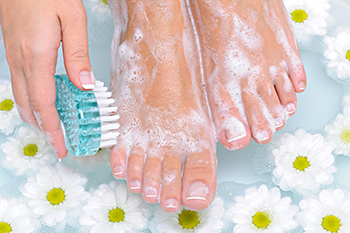
Maintaining proper foot hygiene is essential for overall health and mobility. Daily foot care includes trimming toenails straight across to prevent ingrown nails, keeping feet clean and thoroughly dry to avoid fungal infections, and checking for cracks, sores, or color changes that may indicate underlying issues. Wearing shoes that fit correctly helps prevent blisters, corns, and structural foot problems. A podiatrist can offer professional care, guidance on proper footwear, and early treatment for any emerging conditions. If you notice discomfort, changes in your feet, or have difficulty managing daily foot care, it is suggested that you consult a podiatrist. This type of doctor can treat various foot conditions, and guide you on effective every day foot care tips.
Everyday foot care is very important to prevent infection and other foot ailments. If you need your feet checked, contact Amy DeGirolamo, DPM from Florida Foot and Ankle Associates. Our practitioner can provide the care you need to keep you pain-free and on your feet.
Everyday Foot Care
Often, people take care of their bodies, face and hair more so than they do for their feet. But the feet are a very important aspect of our bodies, and one that we should pay more attention to. Without our feet, we would not be able to perform most daily tasks.
It is best to check your feet regularly to make sure there are no new bruises or cuts that you may not have noticed before. For dry feet, moisturizer can easily be a remedy and can be applied as often as necessary to the affected areas. Wearing shoes that fit well can also help you maintain good foot health, as well as making it easier to walk and do daily activities without the stress or pain of ill-fitting shoes, high heels, or even flip flops. Wearing clean socks with closed shoes is important to ensure that sweat and bacteria do not accumulate within the shoe. Clean socks help to prevent Athlete’s foot, fungi problems, bad odors, and can absorb sweat.
If you have any questions, please feel free to contact our office located in Miami,FL . We offer the newest diagnostic and treatment technologies for all your foot care needs.
